Harvard, the human remains trade, and collectors who fuel the market
What’s most shocking about Jeremy Pauley isn’t his tattooed eyeball or the metal spikes protruding from his scalp.
It’s his openness about trading in human remains.
Standing in the doorway of his rural Pennsylvania home, dressed all in black, he greets an unannounced reporter with patience.
Pauley makes his living in what’s called the “oddities” market, buying and selling human remains and even binding books in human skin. It’s all legal — provided the remains aren’t stolen.
“It’s a niche field,” he says of his work, like “a collector or a preservation artist.” He won’t say much more, because of the sprawling criminal investigation in which he’s a prominent figure.
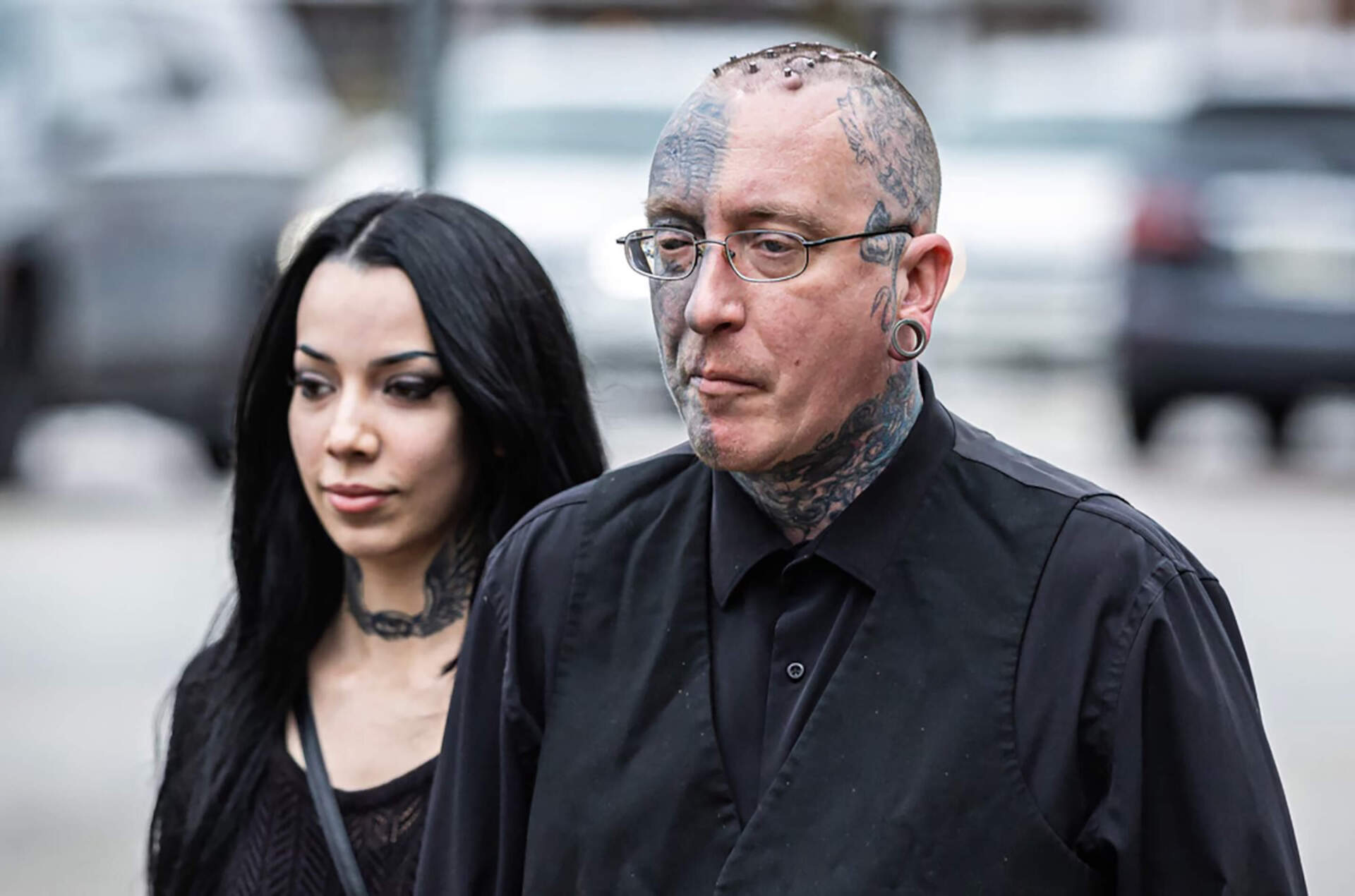
It was Pauley's arrest that pointed investigators to a nationwide network of stolen human remains trafficking and led them to Harvard Medical School. There, a lone morgue manager allegedly plundered parts from bodies donated for science, and sold them online for profit. The crimes themselves were shocking, as was Harvard’s failure to secure its morgue. And the scandal exposed a not-quite-underground market for human remains, where the ethical lines are murky.
There is no federal law against buying or selling human remains and only a patchwork of state laws that go largely unenforced. That’s allowed the trade in so-called “medical specimens” to flourish in retail shops and expos that specialize in oddities — and to explode on the internet.
The body parts marketplace is easy to find, for anyone on the hunt. WBUR didn’t have to scour the dark web to discover a vast realm of mostly legal human remains trading. Large social media groups and conversations among collectors happen openly on Facebook. There are groups with names like “Real human skulls only no scammer” and “The Serious Wet Specimen Collectors, Buyers and Sellers Group.”
Websites like Skulls Unlimited list full human skeletons for upward of $7,000,
and fetal skeletons for more than $4,000.
These items are listed as plainly as kids’ bikes or gym equipment.
One advertised part of a child who’d died choking on a marble.
At some point in Cedric Lodge’s almost 30-year career in the Harvard Medical School morgue, working mostly alone and far from the eyes of his supervisors, he allegedly decided to get a piece of this trade. The supply was right there: dozens of donor bodies, gifted for medical students to learn from in anatomy class.
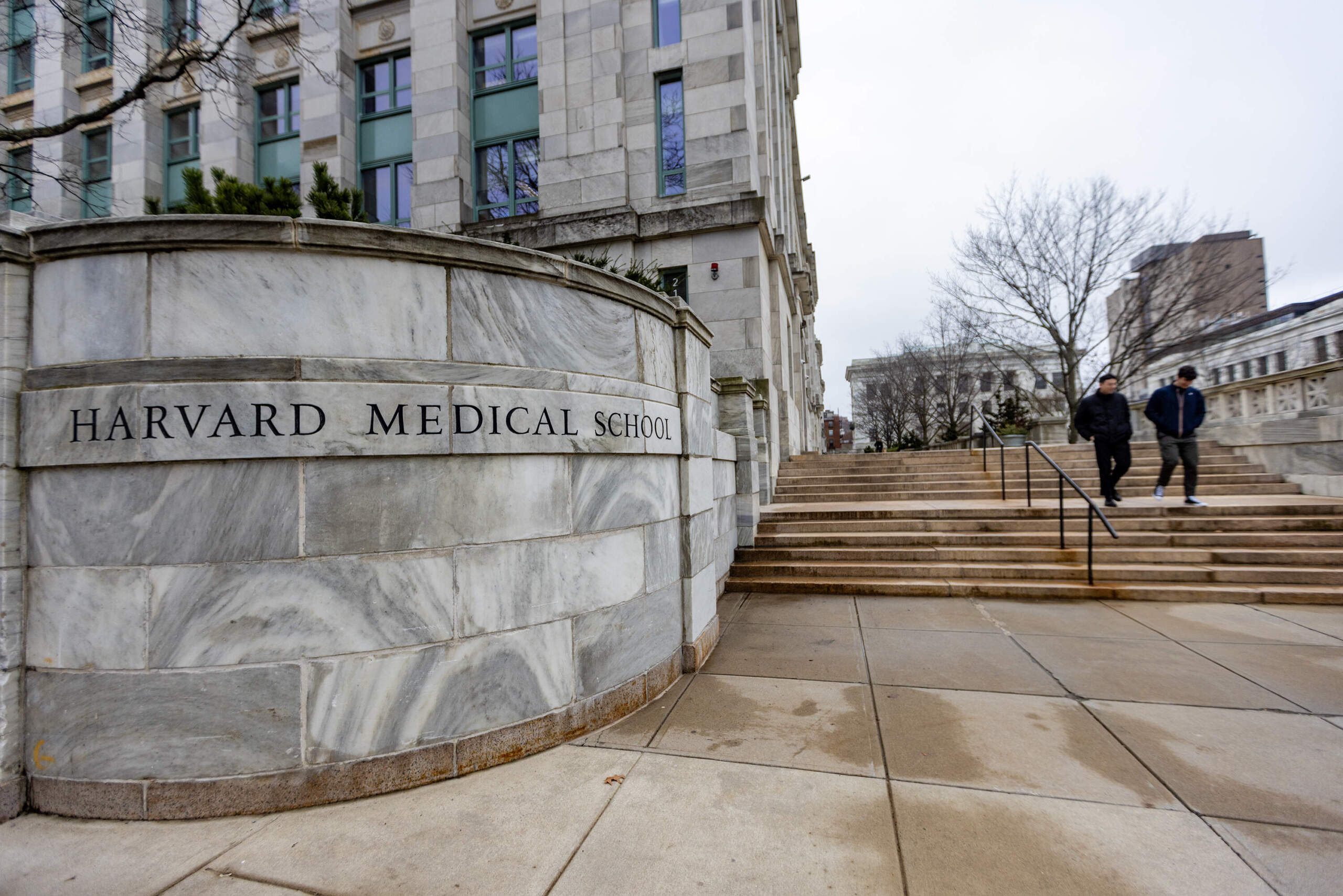
In 2018, prosecutors say, Lodge began stealing body parts from the morgue and taking them home, in his orange Subaru that bore the license plate GRIM-R, to his tidy split-level in Goffstown, New Hampshire. His wife, Denise, would take it from there, handling logistics. She's the one who packed up the goods and took them to the post office, prosecutors allege; she communicated with the buyers and took payments through her PayPal account.
It was a lucrative business. Court records show that one buyer paid Denise Lodge more than $37,000, sending his payments with memos like “head number 7” and “braiiiiiins.”
A deserted Harvard medical campus in October 2020 seems to have given Cedric Lodge even greater opportunity, with classes and labs remote due to the COVID pandemic. Prosecutors say Lodge invited a buyer into the morgue at 1 p.m. on a Wednesday, essentially to shop for parts. The woman took home a brazen haul: two dissected faces, at the price of $600.
The transaction appeared to go undetected by Harvard staff and the school's outside security firm. In fact, nobody at Harvard seems to have been tracking what happened to bodies once medical students were done with their work. And state officials say they do not inspect or oversee medical school morgues.
Advertisement
"There's much better tracing for a head of lettuce than there is for a human head."
Paul Micah Johnson, FBI special agent
“There's much better tracing for a head of lettuce than there is for a human head,” said Paul Micah Johnson, an FBI agent who wasn’t involved in this case but often investigates human remains trafficking crimes between companies — not hobbyists. “We can trace a head of lettuce exactly to the particular farm from which it came and all the steps in between. That's not required with human body parts.”
Lodge, now 56, and his wife, 64, were arrested last June and charged by federal authorities with trafficking in stolen human remains. Cedric Lodge has denied the charges. Denise Lodge took a different path; she pleaded guilty in April and faces up to 10 years in prison.
Denise Lodge’s attorney, Hope Lefeber, blames the whole thing on Cedric Lodge, and suggested the couple may have been motivated by money.
“Her husband was doing this and she just kind of went along with it,” Lefeber said. There may have been financial or health problems at home, the attorney said, noting the Lodges remain married, to her knowledge.
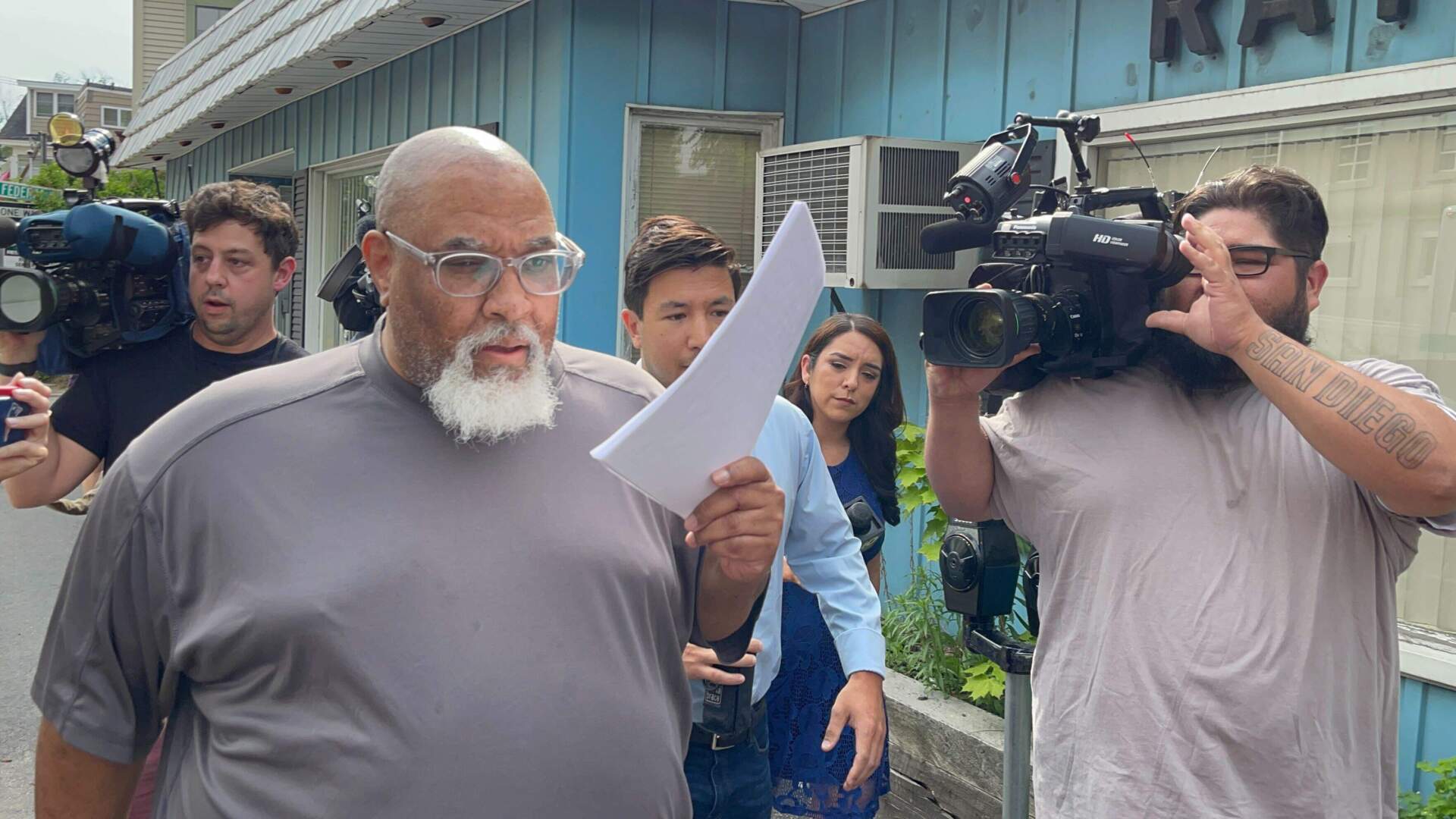
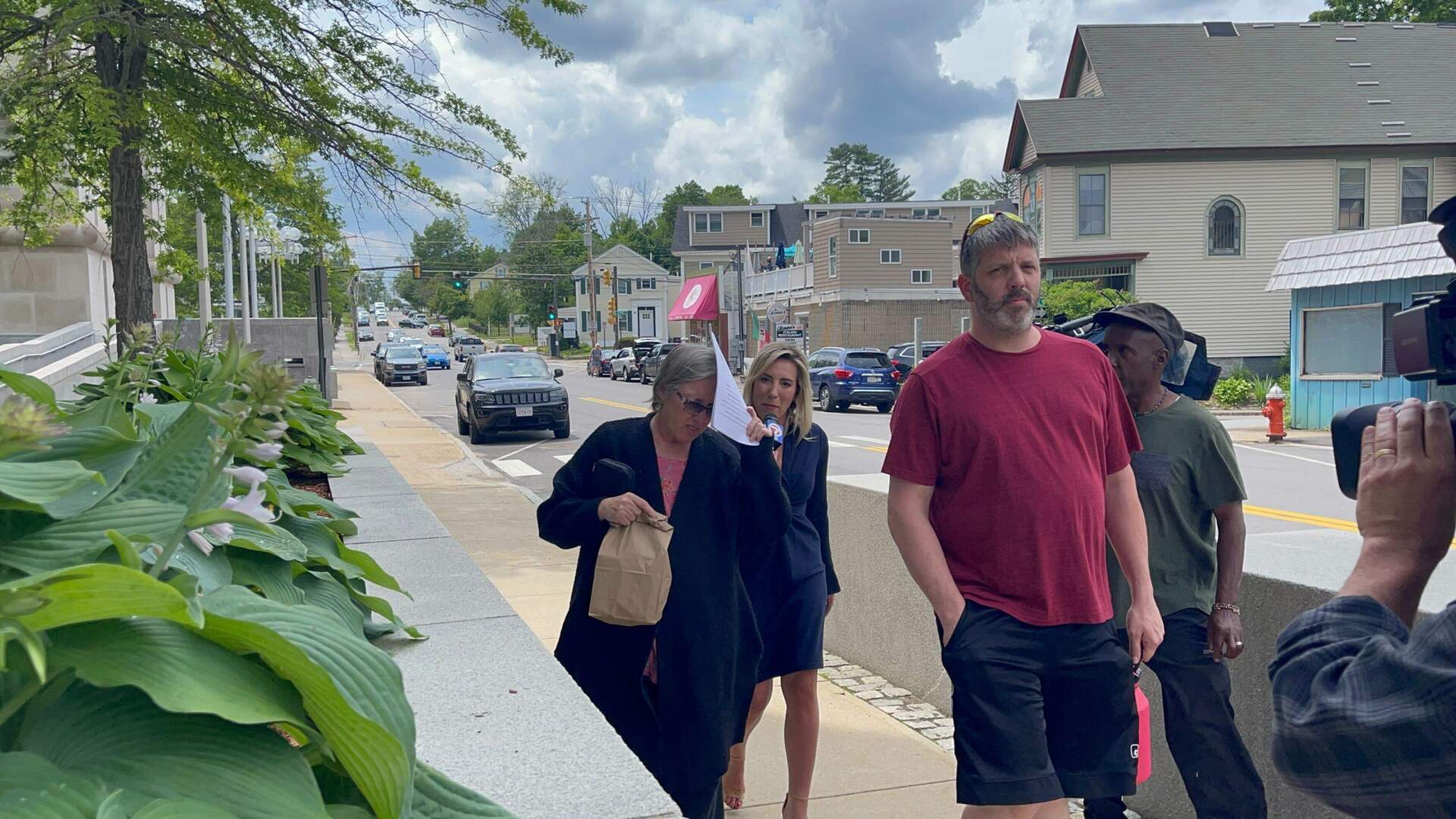
A woman who answered the phone at a number listed for the Lodges declined to comment to WBUR. When a reporter tried to ask for an interview in person, nobody answered the door, although someone appeared to be home.
Officials at Harvard medical school declined to be interviewed. In written responses to WBUR’s questions, the school called Lodge’s alleged actions “shocking, abhorrent, and an appalling violation of Harvard’s expectations that our anatomical donors be treated with reverence, respect, and gratitude.” The school expressed “deep sorrow for the uncertainty and distress that families face as the criminal proceedings continue.”
For at least four years, prosecutors say, Cedric Lodge managed to slice up and steal body parts, undetected by anyone at Harvard. And Lodge might never have gotten caught, but for a phone call in 2022, alerting police in Pennsylvania to a stash in Jeremy Pauley’s basement.
It was a breakup that made it all unravel. Pauley's then-wife had filed for divorce. Not long after, she discovered five-gallon buckets of body parts in their basement and called the cops on him. And when Pauley sat down with police, he told them a lot about his broad network of human remains trading.
Pauley is a pretty famous guy in oddities circles, especially online. He’s a prolific social media poster, sharing photoshoots with his current fiancée and examples of their collaborative “blood art” portraits of serial killers. Some collectors say they considered Pauley a friend, even if they’d never met him in person. He once told the host of an online radio show called “Uncovering the Underground” all about his interests, from collecting “wet specimens” — the jargon for preserved organs and tissues — to using human skin to bind books.
“I was always fascinated by anthropodermic bibliopegy,” Pauley told the interviewer, explaining how he taught himself to turn skin into leather, and how he sourced the raw material. “It's not like it's easy to come by. So I do a lot of work trying to track it down,” he said.
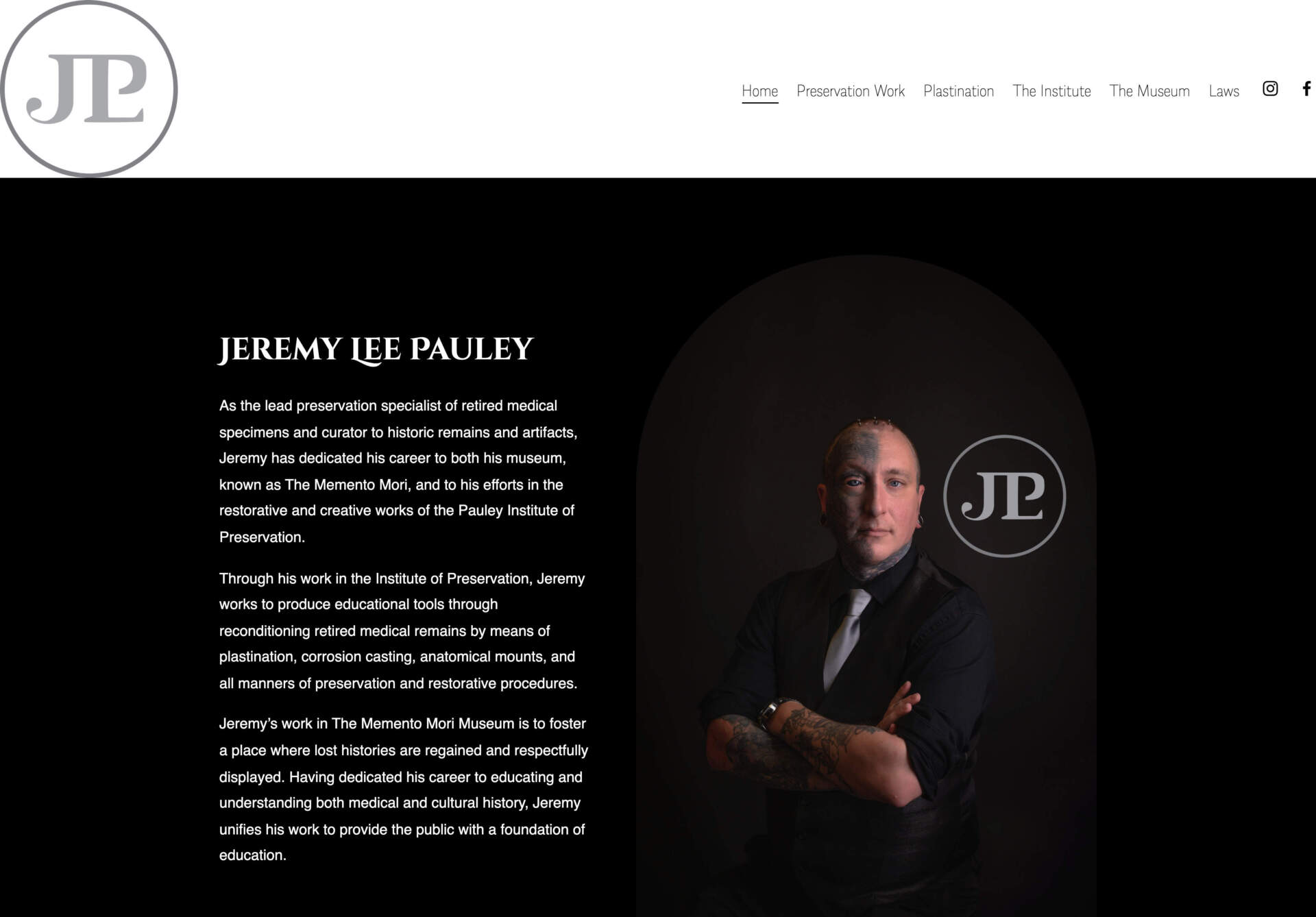
His internet fame helped connect him with a steady supply. One day in October 2021, an Arkansas woman named Candace Chapman Scott messaged Pauley on Facebook, court records show. The mortuary she worked for cremated donated bodies after they’d been studied at the University of Arkansas for Medical Sciences.
"I follow your page and work and LOVE it… Just out of curiosity would you know anyone in the market for a fully intact embalmed brain?” she wrote.
Thus began a fruitful business relationship, with Pauley sending cash via PayPal and Chapman Scott shipping him body parts through the U.S. Postal Service, according to prosecutors. She sent him pieces of skin, brains with skull caps, lungs, testicles and hearts. Over seven months, Pauley paid her more than $10,000.
Chapman Scott also sold Pauley fetuses. As detailed in court records, her discourse with Pauley about these transactions is chilling. She once told Pauley, “We get stillbirths all the time from [the medical school] and basically give the parents back a pinch of ashes from a whole person we cremated.”
In February 2022, a woman in Arkansas gave birth to a stillborn baby boy. She named him Lux. As soon as Lux’s body arrived at the mortuary for cremation, Chapman Scott jumped to message Pauley, court records show. She sold him the tiny body for $300, a deal, she said, because it was "not in great shape." Pauley would later send the fetus, plus $1,550, to a man in Minnesota — for five human skulls.
Lux’s mother received cremated remains from the mortuary. Only later would she learn they were not her baby’s.
No matter how precious what was stolen, the fact is the law doesn’t differentiate between human remains and any other piece of property. Exhibit A: Cedric Lodge was charged with interstate transport of “stolen goods” — not human bodies. (Chapman Scott ultimately pleaded guilty to the same charge, plus conspiracy to commit mail fraud.)
If Lodge had stolen 100 computers from Harvard, "he would have been charged with virtually the same thing,” University of Miami medical school professor Tom Champney said. “It in some ways stems [from] a legal belief — I don't necessarily know if this is an ethical belief — that once you die, you are no longer human and you're now property.”
Champney is among those anatomists who want to see bodies donated to science treated less like inanimate objects and more like former human beings who had lives and desires.
“There should be some middle ground where we treat deceased tissues differently than we treat old refrigerators,” he said.
How it unraveled
His wife, Denise, handled logistics – collecting money from customers and shipping packages.
Taylor also sent human remains to Pauley, who paid him more than $40,000 via PayPal.
(Editor's note: Facebook and WhatsApp messages are illustrations based on court documents.)
Many collectors argue that they treat the human remains in their care with dignity, displaying them as they would art and preserving them for others to learn from.
That includes Pauley. In a brief interview at his front door in November, he told WBUR he was somewhat interested in talking more about his involvement in the oddities world and how he views the human remains he trades in.
“I think bringing more attention to the not-scary side of all this is important,” he said. But Pauley and his attorney never responded to requests for a further interview.
Pauley’s striking appearance has made him the face of an expansive criminal case. Nearly every news article about the Harvard thefts includes his mug shot. And it’s quite a picture. The entire right side of his face is tattooed, as if colored in with blue marker. In some photos, he smiles with a mouth full of silver fangs.
Asked why he thinks he’s indelibly associated with the Harvard case, he said, “I’m clickbait.”
Oddly enough, Pauley never actually bought anything directly from the Lodges, court records show. He got his Harvard remains secondhand, buying them from Cedric Lodge’s alleged customers.
One woman he did business with asked Lodge to be on the lookout for human skin, so she could send it to Pauley, who had been tanning skin for her.
In the podcast interview he gave back in January 2022, before he was arrested, Pauley explained his oddities origin story. He was “the goth kid who never grew up,” who watched the Nickelodeon show “Are You Afraid of The Dark?” and was enraptured by a character who owned a hand preserved in a jar.
“I always had a penchant for wet, especially fetal specimens,” he told the interviewer. “I love them because when I look at them, I don't see a dead baby … Some people see them and they feel sad, but I'm like, do you know how many lives were saved? Because, you know, somebody saved this specimen and it taught doctor after doctor, after doctor.”
Collectors all have their own reasons and rationales for wanting to own these unusual items. One said displaying a skull was “a flex for any goth.” Some admire human remains as medical antiques. Others treat them like fine art. One collector showed off an altar of skulls, where he left Jolly Ranchers and cigarettes as offerings.
A Delaware couple, Justin Capps and Sonya Cobb, doesn’t like using the term “collector” at all. They consider themselves “rescuers” of human remains.
“People rescue puppies and kittens, and we rescue medical specimens,” Capps said. They claim to take in skeletons and other remains that were abandoned in closets or left in disrepair.
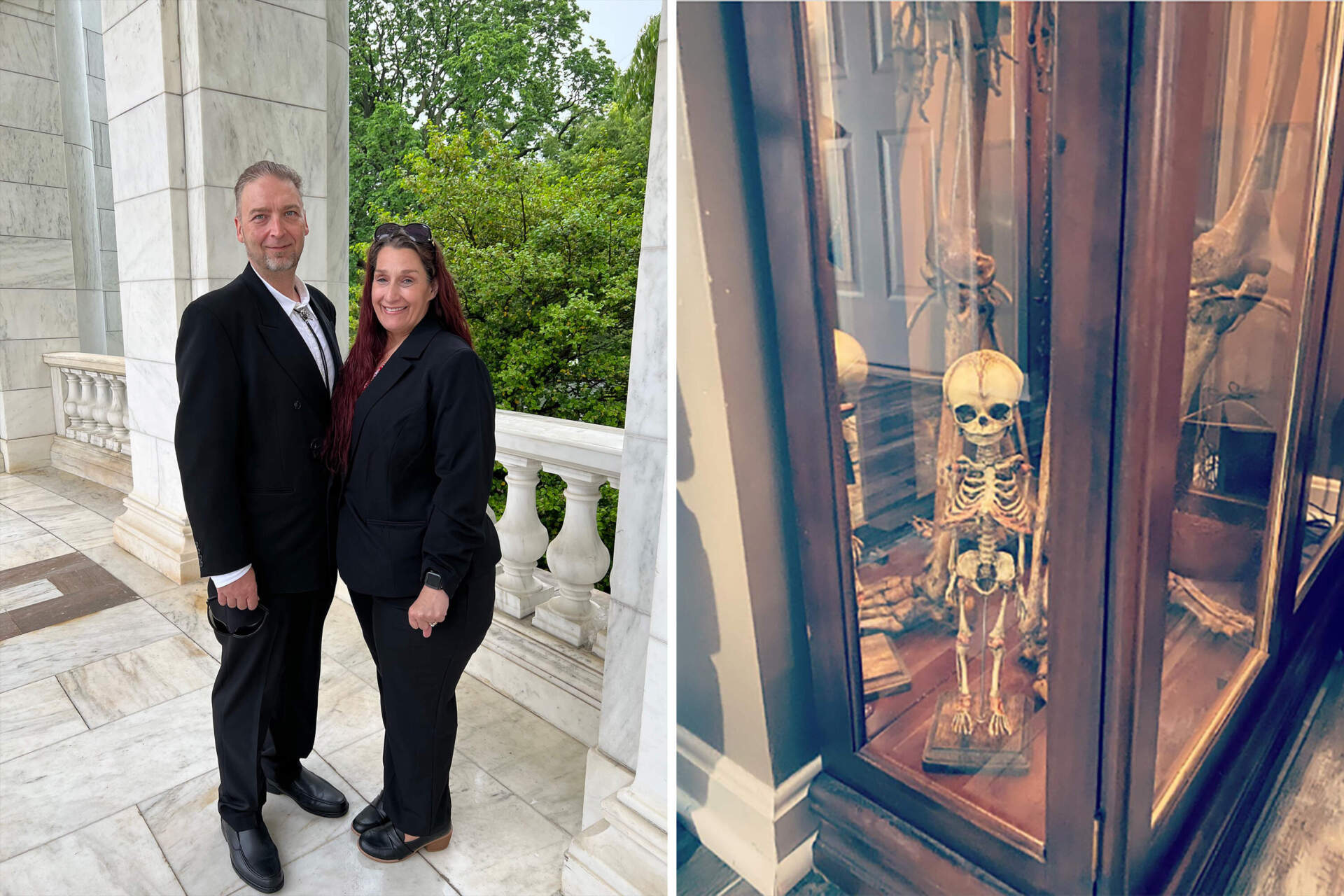
Their entrée to owning human remains began with a skull named Tyler. They spotted him at an oddities shop and felt drawn to him. When COVID hit, and the shop owner was in financial straits, Capps offered up a $1,200 loan, with Tyler as collateral. They say the shop owner never paid them back, and Tyler now sits under their living room television in a glass box.
After getting Tyler, “ I needed a whole skeleton for the corner,” Cobb said.
So Capps started looking. But the idea of paying money for a skeleton didn’t feel quite right to him at first. “These are former people,” Capps said. “These were someone's parents, someone's children, brothers, sisters. They need a little bit more respect than they're given.”
He eventually found a fraternal organization — he won’t say which one — looking to give away some skeletons they’d kept in a closet. And that’s how the couple’s living room became home to seven adult skeletons. They also have a 36-week fetal skeleton, with bones so tiny they look like toothpicks.
Capps and Cobb open up their living room to visitors who want to check out the bones; they do this under their nonprofit organization, The Ossuary. The two say they think about whose bones are in their care, who they were as people when they were alive. Capps said he wonders how many had a choice about whether they’d become a medical specimen.
“The only way I was able to get over any of it was to have a sit-down conversation with each one of them that come in here and explain: 'I'm not going to disrespect you, I'm going to treat you like you should be treated,' ” he said. “ 'You're going to be living in my home … we might as well get used to each other. So, don't haunt me.' ”
Not everyone worries so much about the origins of the remains they own. Mike Drake, a New York City collector of all manner of items, from “death masks” to glass eyes, still has the first skull he ever bought as a teenager at the occult store Magickal Childe. He said he paid $100 for it.
“I don't ever really think about who that was, any more than I think about what happened to the turtle that was in that shell,” Drake said, pointing to another curiosity in his cabinet.
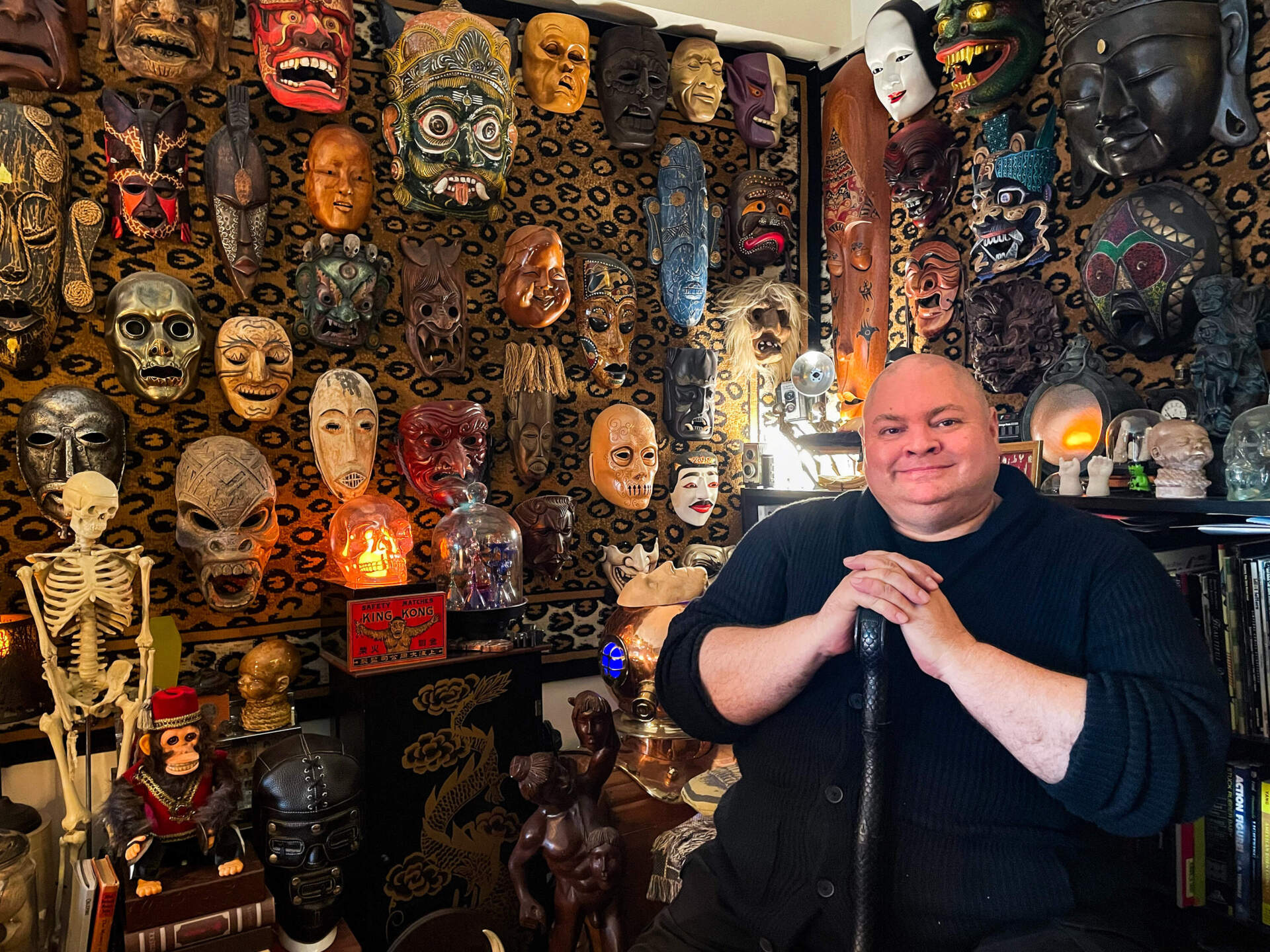
Drake worked as a middleman of the skeleton trade in the 1990s, he said, selling human skeletons to medical students, prop masters and others who needed what was then a cheaper option than a plastic replica. He knew the skeletons he moved around in his Chevy Cavalier came mostly from China and India, but that’s about all.
“I don't want to sound uncaring or ghoulish, but I separate the person from the meat,” he explained. “I'm really my brain, and my thoughts, and my spirit and maybe my soul. Once my body is turned off forever, this isn't me. This is just my container, my wrapper.”
Still, Drake said, if he knew the skull on his shelf belonged to someone’s family and they wanted it back, he’d give it to them.
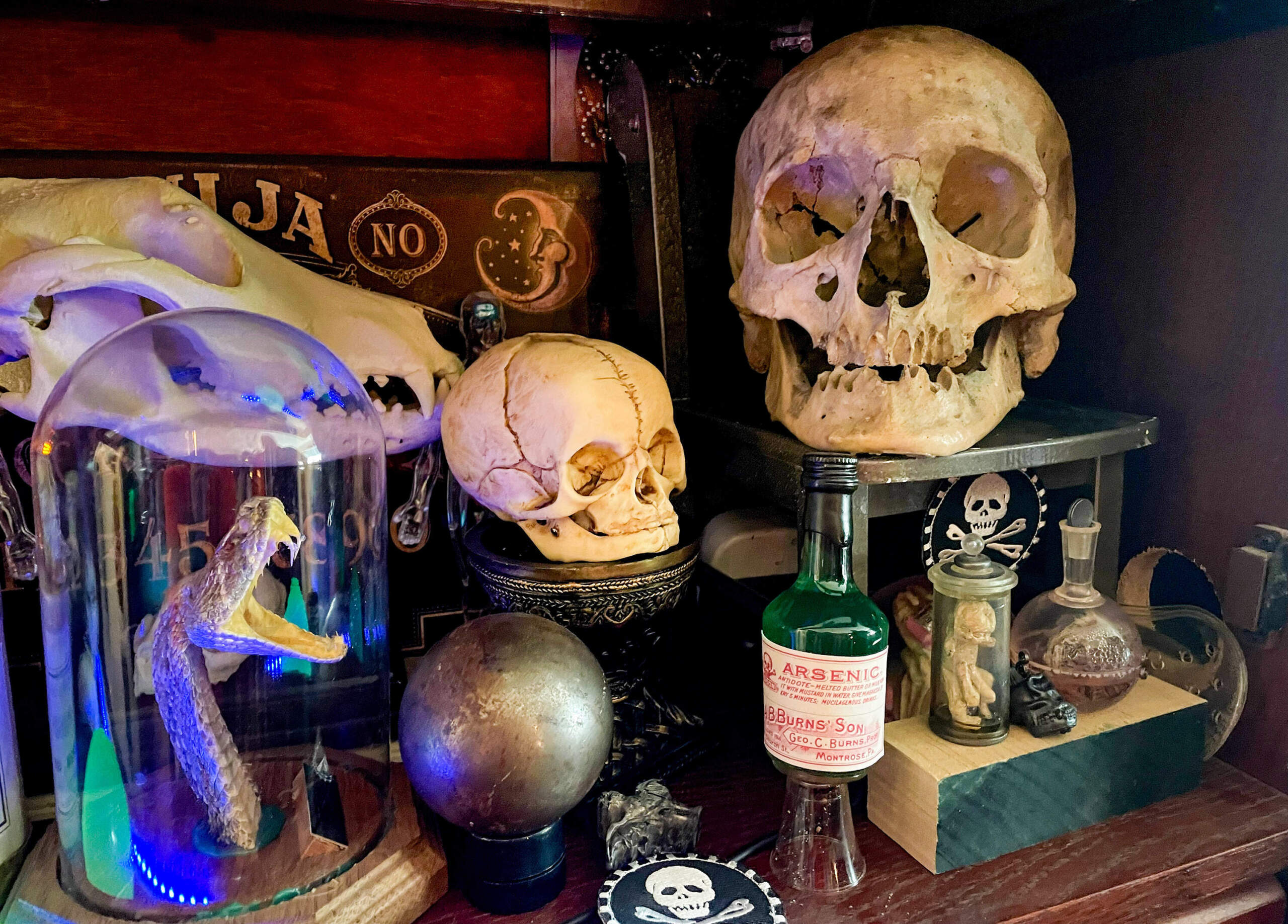
With few laws governing human remains trading, those involved in it make their own rules and draw their own ethical boundaries.
In some cases, that means reconsidering what they own and display, and examining how the items were obtained. Even some major museums are reckoning with these issues, including the Smithsonian and the American Museum of Natural History in New York, which has pulled all its human remains from public display.
In April, Harvard pulled from the shelves one of its library’s most famous artifacts: a 19th century book bound in human skin. The university removed the human binding and is working to find a final respectful resting place for those remains.
The Mütter Museum, part of the College of Physicians of Philadelphia, has more than 6,600 human remains in its collection. For the first time ever, it’s looking into the origins and consent behind all those items.
“We need to make sure that we have them ethically,” Mütter Museum Executive Director Kate Quinn said, “and that we've got some measure of all of the research that we can about these individuals to say that we feel with confidence this person would have been all right being here.”
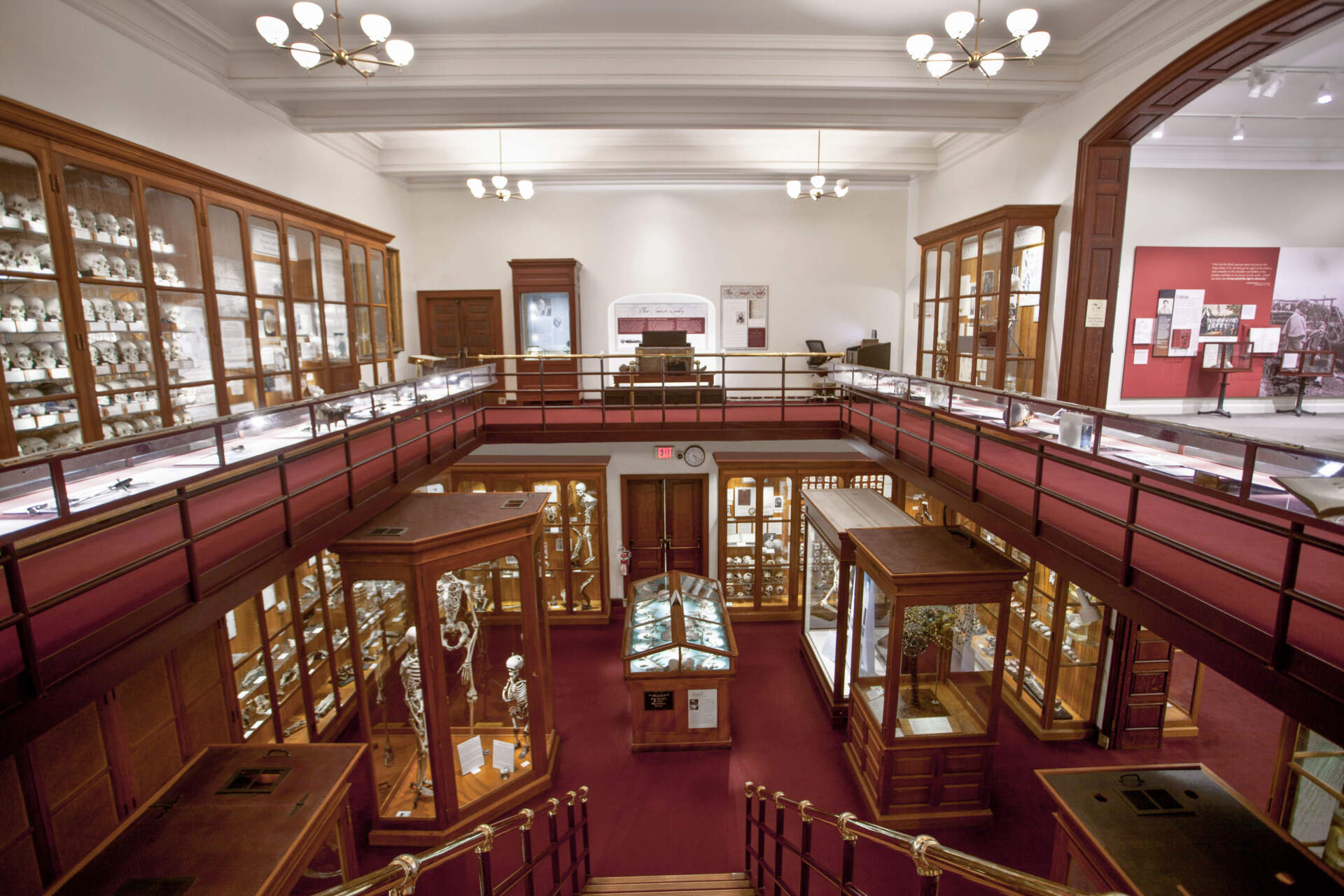
Many collectors, including Jeremy Pauley, talk about wanting to open their own museums some day. And while Pauley’s personal collection of fetuses and skulls may be troubling to critics, at the Mütter Museum and other institutions, visitors will pay $20 admission to look at many of the same sorts of items.
For some, the passage of time gives museums cover to hold historical medical specimens, collected decades or centuries ago under circumstances that would not be acceptable today.
There are doctors who convinced bereft mothers to sign away their stillborn babies, and grave robbers who dug up fresh bodies for dissections. But there’s still plenty of interest in these items. The case against Cedric Lodge reveals an obvious modern demand for human remains.
For its part, Harvard has avoided any real blowback after Lodge’s arrest. The medical school fired Lodge, then successfully fought to dismiss lawsuits filed by family members of donors. And while administrators have called what happened an “abhorrent betrayal,” they have refused to say whether anyone else at Harvard was investigated or disciplined. An internal review commissioned by Harvard avoided the entire matter of the institution’s failure to supervise Lodge and to keep a close watch on the morgue. In all the school’s public statements, the thefts are blamed on a single, rogue employee.
Back in rural Pennsylvania, the state and federal charges Pauley has faced seem not to have dampened his enthusiasm for the oddities trade. He still posts online about “human osteology” for sale, even as he serves two years probation for abuse of a corpse. He’s still awaiting sentencing on federal charges of conspiracy and interstate transport of stolen goods.
Just this spring, he announced on Facebook that he and his fiancée have fulfilled a dream and opened up a shop in the quaint downtown of Honesdale, Pennsylvania. Among the wares they plan to sell: human bones.
